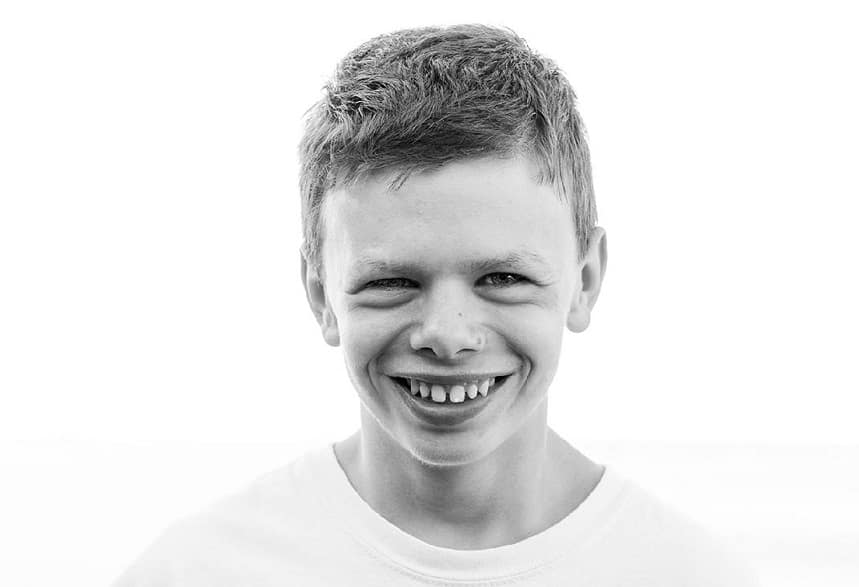
Rare disease day is the 28th of Feb (29th when it’s a leap year) Take some time this week and learn about a rare condition or disease.
Those with Williams syndrome are possibly the world’s most friendly people!
Having the privilege to know a fun and friendly person with Williams Syndrome is what first made me aware of this disorder.
My children have a second cousin who has been diagnosed with Williams Syndrome. She is a fantastic girl and we took a special liking to each other.
I enjoyed following her progress from a six-year-old who was scared of my daughter because she kept crying, to an outgoing thirteen-year-old who is fun to connect with.
I am excited to interview her mother who has graciously agreed to share some of her best tips for raising a child with Williams Syndrome (WS).
Because Williams Syndrome is a rare disease there seems to be a lack of parent-shared practical information online outside of forums, so I hope this post can be a help to anyone feeling alone in their journey of raising a special needs child.

In a nutshell, what is Williams Syndrome?
In General, a child with Williams Syndrome is amazingly loving, extremely friendly, and often worryingly uninhibited. Scientists believe that higher levels of Oxytocin are responsible for the happy, friendly behavior that those with WS are known for.
Several health issues are associated with WS. There can be significant cardiovascular, kidney, or calcium issues, low muscle tone, joint issues, hormone balance problems, visual spacial issues, and blood pressure concerns among other things!
Although most people with Williams Syndrome have a mild to moderate intellectual disability, they are usually quick to learn verbal skills. Many kids with WS learn at least two languages!
A mother, raising a boy with Williams Syndrome told me that her son was phenomenal at languages! Her son learned (and remembered) songs and sayings in many languages. He understands a bit of Russian, German, Gaelic, and several other languages!
One of the things that are so typical for those with Williams Syndrome is their verbal ability! I haven’t met any person with WS in Sweden who doesn’t speak fluent English as a second language! They are extremely talented when it comes to learning languages, dialects, and music!
Lina Karna Kippel
Being bilingual is easy for this gang. Some scientists even say that you could id a person with Williams Syndrome! by just looking at their IQ-test!
Their IQ curve is so significant!
Their top score when it comes to music and language is many times far better than the rest of us without WS!
Lina Karna Kippel
Children with Williams Syndrome often believe everyone has good intentions which makes them vulnerable and can be a constant worry to parents!
Their friendliness, however, makes them naturally easy to like and be around so there is a reason this particular syndrome has got the nickname cocktail party syndrome.

What are some of the parenting challenges you faced during different stages of life?
The biggest one for me has been having the patience to be consistent. Absolutely everything has taken longer to master than you could expect from a child without a diagnosis.
Anna’s Mom
Take for example getting dressed. The patience required month after month guiding and coaching a child to dress themselves when there is a significant lack of fine motor skills Is monumental!
It would have been unbelievably quicker and easier to do it myself.
Reminding her that the tag goes in the back for the next few years is put into perspective while teaching my other 2 children the same skill, where the lesson takes a few quick instructions and then they get it.
The result, however, is all the more rewarding, and who cares if it took years longer to learn how to dress, how to walk upstairs, how to swim, how to butter your bread, etc. Once it’s been achieved, then no one can take it away from her.
Anna’s Mom
I would also say that generally what’s on the list of things we worry about with Anna is quite different from our other kids.

Can you highlight some of the main things that you found challenging as she was growing up?
She was, in many ways, an easy child and always seemed quite happy to watch the world carry about its business around her.
That was also a reason why we never committed to learning sign language as her speech was delayed. She never showed the natural frustration you could expect when unable to make herself understood.
A red thread through her childhood has been my obsession with routines which to many people can seem annoying and limiting but for Anna has meant that she has almost always been able to know what to expect. I’m convinced that, that has helped her understand her surroundings and feel secure.
Practical difficulties arose when she still didn’t walk at age 2 so I had to carry her as well as her baby sister.
She was late with. . .
- Potty training,
- Talking
- Walking
- All Fine Motor skills
- All Gross Motor skills
This took patience and extra planning.
A steady stream of doctor’s appointments and a constant worry about a whole list of health issues was still balanced by increasing awareness of how most issues could have been a lot worse and thankfulness for her easy-going nature.
Anna’s Mom

Can those with Williams Syndrome live on their own or get a job?
In certain cases, I’m sure they can but a prerequisite is of course still an individual’s circumstances.
Generally, there will always be a need for support both at home and at work as completely independent living and working is a lot to expect from someone who faces the obvious challenges that people with WS have.

A Mother’s tips for raising a child with Williams syndrome.
- Raising a child with WS is always going to be challenging one way or another.
- Almost all children with WS have some sort of phobia (usually sound related for example a fear of fire alarms going off, young children screaming/crying, vacuum cleaners, etc).
- Following even simple instructions can be confusing for a person with WS and they often need to be closely supervised.
- Their relatively good verbal skills don’t always mean they have understood or read the situation correctly. I often counter an instruction or statement with a question -for example: Can you put your clothes in the wash basket? This is followed by; Where are you going to put your clothes? Or: We are eating in 10 minutes. This is followed by; When are we going to eat?
- The lack of sense of direction applies to a small grocery shop as well as a large city center.
- Poor circulation often means cold hands/ feet so good gloves and shoes are a valuable investment for the winter months.
- A WS child’s ability to grasp a concept is often closely associated with their level of interest so if they must understand something -try to make it interesting.
- Stable routines are important, especially regarding food and sleep. If you manage to keep someone well fed and rested then you are halfway there.
- Despite daily challenges, you will find that someone with WS manages to surprise you every day with their humor, lovingness, and genuine empathy towards other people.
- Find strength in the knowledge that you know your child the best and be secure in the knowledge that the decisions you make for your child are the best for them.
- Be consistent, choose your battles, and cut yourself some slack when it all feels a bit much.
If you are looking for more information on Williams Syndrome or a community to help your family, the links below are a good place to start.

Having a Child with a diagnosis is hard!
Having two kids of my own who didn’t fit in the typical mold I (Annie) have been on the brink of exhaustion many times!
ADHD looked different at different stages for my kids and was sometimes accompanied by a steep learning curve for me because one of my kids suddenly hit a rough patch!
Learning to be an advocate for my kids at school, and standing up to doctors who didn’t want to listen, when our ADHD Medicines weren’t working was key for us.
Annie Eklöv
We struggle with combined ADHD, Dyslexia, and some sensory issues.
My son (ADHD Predominately Hyper) has always struggled to sleep, and my daughter (ADHD predominately inattentive) has been off and on chronically constipated since she was small. These are little-known problems associated with ADHD.
It’s nearly impossible for those who do not have kids with special needs to understand the emotional roller coaster that can accompany everyday things like eating or getting dressed.
Annie Eklöv
When my son was younger he refused to wear normal pants for 2.5 years!
The one exception was the pants that he and I designed together which we called ADHD pants! I was constantly sewing pants because he was continually growing and wearing them out!
Parents can do the weirdest things to help their kids!

Lend a helping hand to families of Special Needs Kids
Sometimes disabilities are not obvious at the first glance. This makes things more difficult for parents who often need to explain why their child is behaving in such a way, over and over again.
Often parents of special needs kids are exhausted and long to be understood!
They need more time for self-care than their schedule allows, and they usually have a pang of nagging guilt that the siblings of their special needs child are not getting enough of their attention!
Annie Eklöv
If you have a special needs child and know of other families with special needs kids near you, support each other! Your children don’t have to have the same diagnosis for you to lend a listening ear and offer to help!
If you are reading this post because someone you know has Williams Syndrome don’t hesitate to lend a helping hand!
Receiving a plate of cinnamon rolls, a card, or having someone offer to watch my kids has brought tears to my eyes because someone cared!
It’s the thought that counts!
Please read my post on Awareness for Williams Syndrome
This post is helpful for. . .
- Those who regularly meets someone with Williams Syndrome
- Anyone who wants to learn more about what Williams Syndrom is
- Those who know nothing or very little about Williams
Support for those with Williams Syndrome
Our society Williams Syndromföreningen in Sweden is very important for us and is where we parents get support and more knowledge. What you learn from other parents is different from all the talks you have with doctors often it’s the most valuable!!!
Lina KArna Kippel
There are similar Facebook groups and online support groups in the USA and other countries. You can search your Facebook groups to find a group in your language.
There are Facebook groups for both parents and those with Williams Syndrome in Sweden. Check out the link below.
http://williamssyndrom.se/williams-syndromforening-i-sverige/

Self-care for caregivers
Here is a link to my article about self-care for caregivers! This is what helped me when I was on the verge of depression.
The ADHD Minimalist.com
My blog is mainly about helping families with ADHD. My son found that living minimally helped his ADHD symptoms, and theADHDMinimalist.com was born.
If you have ADHD in your family, check out the resources page.
Most of my articles on ADHD can be found here.
Articles written in the last few weeks can be found on the blog’s home page.
To preserve privacy, we used an assumed name in this interview. None of the pictures are of Anna, although, many of the pictures are of wonderful individuals, who have been diagnosed with Williams Syndrome!



